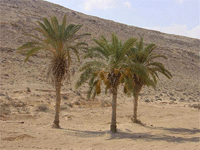Drylands & Desertification
Sustainable management of drylands through research, conservation and education

- © UNESCO/T. Schaaf
Drylands are particularly vulnerable due to climatic variability and human pressures. Deterioration of soil and plant cover has adversely affected 70% of the world's drylands. Moreover, the countries and people most affected by desertification are often those with the least resources. Yet it is possible to combat desertification by sustainably managing drylands, rehabilitating degraded areas, and by educating youth. The UNESCO-MAB drylands programme promotes:
- Sustainable Management of Marginal Drylands (SUMAMAD) Project through applied field studies
- International conferences and workshops to share scientific expertise
- Environmental education for primary schools and secondary schools to foster capacity-building
- Conservation and sustainable development of dryland ecosystems using biosphere reserves
- Four UNESCO Chairs in Desertification (Belgium; Israel; Jordan; Sudan)
- Publications on desertification and dryland ecoystems (see below)
Related links:
Mr Thomas Schaaf
- Chief, Section of Ecological Sciences and Biodiversity; Dryland management and combating desertification, Mountain research and conservation, Culture-based environmental conservation, Asia-Pacific region
More

Sustainable Management of Marginal Drylands (SUMAMAD)
- Start Date:
- 14-09-2010 -
- End Date:
- 14-09-2010
More
- 12-11-2007

